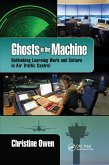- Broschiertes Buch
- Merkliste
- Auf die Merkliste
- Bewerten Bewerten
- Teilen
- Produkt teilen
- Produkterinnerung
- Produkterinnerung
This volume illuminates the challenges and solutions for military HRI and so provides a better understanding of this complex concept. It enables scientists investigating military HRI issues to present their results within a single volume. Issues range from operators interacting with small ground robots and aerial vehicles to supervising large, near-autonomous vehicles capable of intelligent battlefield behaviors. The book's focus is the ability of the human to 'team' with intelligent unmanned systems in such environments.
Andere Kunden interessierten sich auch für
![Human-Systems Integration Human-Systems Integration]() Guy André BoyHuman-Systems Integration88,99 €
Guy André BoyHuman-Systems Integration88,99 €![Human-Robot Interaction in Social Robotics Human-Robot Interaction in Social Robotics]() Takayuki KandaHuman-Robot Interaction in Social Robotics105,99 €
Takayuki KandaHuman-Robot Interaction in Social Robotics105,99 €![Human Factors in Simulation and Training Human Factors in Simulation and Training]() Human Factors in Simulation and Training71,99 €
Human Factors in Simulation and Training71,99 €![Social Media Analytics for User Behavior Modeling Social Media Analytics for User Behavior Modeling]() Arun Reddy NelakurthiSocial Media Analytics for User Behavior Modeling64,99 €
Arun Reddy NelakurthiSocial Media Analytics for User Behavior Modeling64,99 €![Ghosts in the Machine Ghosts in the Machine]() Christine OwenGhosts in the Machine74,99 €
Christine OwenGhosts in the Machine74,99 €![Development of a Remote Laboratory for Engineering Education Development of a Remote Laboratory for Engineering Education]() Ning WangDevelopment of a Remote Laboratory for Engineering Education27,99 €
Ning WangDevelopment of a Remote Laboratory for Engineering Education27,99 €![Cognitive Systems Cognitive Systems]() Cognitive Systems73,99 €
Cognitive Systems73,99 €-
-
-
This volume illuminates the challenges and solutions for military HRI and so provides a better understanding of this complex concept. It enables scientists investigating military HRI issues to present their results within a single volume. Issues range from operators interacting with small ground robots and aerial vehicles to supervising large, near-autonomous vehicles capable of intelligent battlefield behaviors. The book's focus is the ability of the human to 'team' with intelligent unmanned systems in such environments.
Produktdetails
- Produktdetails
- Verlag: CRC Press
- Seitenzahl: 256
- Erscheinungstermin: 31. März 2017
- Englisch
- Abmessung: 234mm x 156mm x 24mm
- Gewicht: 649g
- ISBN-13: 9781138071704
- ISBN-10: 1138071706
- Artikelnr.: 48241684
- Verlag: CRC Press
- Seitenzahl: 256
- Erscheinungstermin: 31. März 2017
- Englisch
- Abmessung: 234mm x 156mm x 24mm
- Gewicht: 649g
- ISBN-13: 9781138071704
- ISBN-10: 1138071706
- Artikelnr.: 48241684
Michael Barnes is a Research Psychologist with the US Army Research Laboratory (ARL). For the past five years, he was the lead for the human robotic interaction (HRI) program that included both military and university research as part of an Army Technology Objective: Robotic Collaboration. His past experience includes tenure with the US Navy and as a human factors manager with General Electric. Also, he has served on a number of international committees related to HRI. He has authored or co-authored over 60 articles on the human element of military systems. Located at Ft. Huachuca, AZ, his research interests include investigations of risk visualization, intelligence processes and unmanned aerial vehicles crew systems. Florian Jentsch, Ph.D., is an Associate Professor at the University of Central Florida, Orlando, with joint appointments in the Department of Psychology and the Institute for Simulation & Training. He is also the Director of the Team Performance Laboratory. He received his Ph.D. in Human Factors Psychology in 1997, and he holds master's degrees in aeronautical science and aeronautical engineering. Dr. Jentsch is associate editor for Human Factors and for Cognitive Technology, and consulting editor for the International Journal of Applied Aviation Studies. His research interests are in team performance and training, pilot training and performance, human-robot interaction, and simulation methodology. Dr. Jentsch has co-authored over 200 publications and presentations; this is his second edited book.
Part I Introduction to HRI; Chapter 1 An Introduction to Human-Robot Interaction in Military Applications
A. William EvansIII; Chapter 2 Soldier-Robot Teams in Future Battlefields
Michael J.Barnes
A. William EvansIII; Chapter 3 The Safe Human-Robot Ratio
Robin R.Murphy
Jennifer L.Burke; Part II Foundations of HRI; Chapter 4 The Cognitive Psychology of Human-Robot Interaction
Douglas J.Gillan
JenniferRiley
PatriciaMcDermott; Chapter 5 Social Factors in Human-Robot Interaction
Lori FosterThompson
Douglas J.Gillan; Chapter 6 Robots in Space and Time
Skye L.Pazuchanics
Roger A.Chadwick
Merrill V.Sapp
Douglas J.Gillan; Chapter 7 Automation Strategies for Facilitating Human Interaction with Military Unmanned Vehicles
KerylCosenzo
RajaParasuraman
Ewartde Visser; Chapter 8 An Analytical Approach for Predicting Soldier Workload and Performance Using Human Performance Modeling
Diane KuhlMitchell
CharnetaSamms; Part III UAV Research; Chapter 9 Introductionducing Cognitive and Co-operative Automation into Uninhabited Aerial Vehicle Guidance Work systems
AxelSchulte
ClaudiaMeitinger; Chapter 10 Situation Awareness in Human-Robot Interaction
Jennifer M.Riley
Laura D.Strater
Sheryl L.Chappell
Erik S.Connors
Mica R.Endsley; Chapter 11 Imperfect Reliability in Unmanned Air Vehicle Supervision and Control
Christopher D.Wickens
BrianLevinthal
StephenRice; Chapter 12 Remotely Operated Vehicles (ROVs) from the Bottom-Up Operational Perspective
TalOron-Gilad
YanivMinkov; Chapter 13 Unmanned Aerial Vehicles
GloriaCalhoun
MarkDraper; Part IV UGV Research; Chapter 14 Telepresence Control of Unmanned Systems
ChrisJansen
Jan B F.van Erp; Chapter 15 Multimodal Research for Human Robot Interactions
Ellen C.Haas
Jan B.F.van Erp; Chapter 16 Robotics Operator Performance in a Multi-Tasking Environment
Jessie Y.C.Chen; Chapter 17 A Cognitive Systems Engineering Approach for Human-Robot Interaction
LaurelAllender
Patricia L.McDermott
JasonLuck; Chapter 18 Robotic Control Systems for Dismounted Soldiers
Elizabeth S.Redden
Linda R.Elliott; partV Cross-platform Research; Chapter 19 Lessons Learned from Human-Robotic Interactions on the Ground and in the Air
Nancy J.Cooke
Roger A.Chadwick; Chapter 20 On Maximizing Fan-Out
Michael A.Goodrich; Chapter 21 Coordination and Automation for Controlling Robot Teams
MichaelLewis
JijunWang; Chapter 22 Model World
FlorianJenstch
A. William EvansIII
ScottOsosky; partVI Future Directions; Chapter 23 The Future of HRI
A. William EvansIII
Florian G.Jentsch;
A. William EvansIII; Chapter 2 Soldier-Robot Teams in Future Battlefields
Michael J.Barnes
A. William EvansIII; Chapter 3 The Safe Human-Robot Ratio
Robin R.Murphy
Jennifer L.Burke; Part II Foundations of HRI; Chapter 4 The Cognitive Psychology of Human-Robot Interaction
Douglas J.Gillan
JenniferRiley
PatriciaMcDermott; Chapter 5 Social Factors in Human-Robot Interaction
Lori FosterThompson
Douglas J.Gillan; Chapter 6 Robots in Space and Time
Skye L.Pazuchanics
Roger A.Chadwick
Merrill V.Sapp
Douglas J.Gillan; Chapter 7 Automation Strategies for Facilitating Human Interaction with Military Unmanned Vehicles
KerylCosenzo
RajaParasuraman
Ewartde Visser; Chapter 8 An Analytical Approach for Predicting Soldier Workload and Performance Using Human Performance Modeling
Diane KuhlMitchell
CharnetaSamms; Part III UAV Research; Chapter 9 Introductionducing Cognitive and Co-operative Automation into Uninhabited Aerial Vehicle Guidance Work systems
AxelSchulte
ClaudiaMeitinger; Chapter 10 Situation Awareness in Human-Robot Interaction
Jennifer M.Riley
Laura D.Strater
Sheryl L.Chappell
Erik S.Connors
Mica R.Endsley; Chapter 11 Imperfect Reliability in Unmanned Air Vehicle Supervision and Control
Christopher D.Wickens
BrianLevinthal
StephenRice; Chapter 12 Remotely Operated Vehicles (ROVs) from the Bottom-Up Operational Perspective
TalOron-Gilad
YanivMinkov; Chapter 13 Unmanned Aerial Vehicles
GloriaCalhoun
MarkDraper; Part IV UGV Research; Chapter 14 Telepresence Control of Unmanned Systems
ChrisJansen
Jan B F.van Erp; Chapter 15 Multimodal Research for Human Robot Interactions
Ellen C.Haas
Jan B.F.van Erp; Chapter 16 Robotics Operator Performance in a Multi-Tasking Environment
Jessie Y.C.Chen; Chapter 17 A Cognitive Systems Engineering Approach for Human-Robot Interaction
LaurelAllender
Patricia L.McDermott
JasonLuck; Chapter 18 Robotic Control Systems for Dismounted Soldiers
Elizabeth S.Redden
Linda R.Elliott; partV Cross-platform Research; Chapter 19 Lessons Learned from Human-Robotic Interactions on the Ground and in the Air
Nancy J.Cooke
Roger A.Chadwick; Chapter 20 On Maximizing Fan-Out
Michael A.Goodrich; Chapter 21 Coordination and Automation for Controlling Robot Teams
MichaelLewis
JijunWang; Chapter 22 Model World
FlorianJenstch
A. William EvansIII
ScottOsosky; partVI Future Directions; Chapter 23 The Future of HRI
A. William EvansIII
Florian G.Jentsch;
Part I Introduction to HRI; Chapter 1 An Introduction to Human-Robot Interaction in Military Applications
A. William EvansIII; Chapter 2 Soldier-Robot Teams in Future Battlefields
Michael J.Barnes
A. William EvansIII; Chapter 3 The Safe Human-Robot Ratio
Robin R.Murphy
Jennifer L.Burke; Part II Foundations of HRI; Chapter 4 The Cognitive Psychology of Human-Robot Interaction
Douglas J.Gillan
JenniferRiley
PatriciaMcDermott; Chapter 5 Social Factors in Human-Robot Interaction
Lori FosterThompson
Douglas J.Gillan; Chapter 6 Robots in Space and Time
Skye L.Pazuchanics
Roger A.Chadwick
Merrill V.Sapp
Douglas J.Gillan; Chapter 7 Automation Strategies for Facilitating Human Interaction with Military Unmanned Vehicles
KerylCosenzo
RajaParasuraman
Ewartde Visser; Chapter 8 An Analytical Approach for Predicting Soldier Workload and Performance Using Human Performance Modeling
Diane KuhlMitchell
CharnetaSamms; Part III UAV Research; Chapter 9 Introductionducing Cognitive and Co-operative Automation into Uninhabited Aerial Vehicle Guidance Work systems
AxelSchulte
ClaudiaMeitinger; Chapter 10 Situation Awareness in Human-Robot Interaction
Jennifer M.Riley
Laura D.Strater
Sheryl L.Chappell
Erik S.Connors
Mica R.Endsley; Chapter 11 Imperfect Reliability in Unmanned Air Vehicle Supervision and Control
Christopher D.Wickens
BrianLevinthal
StephenRice; Chapter 12 Remotely Operated Vehicles (ROVs) from the Bottom-Up Operational Perspective
TalOron-Gilad
YanivMinkov; Chapter 13 Unmanned Aerial Vehicles
GloriaCalhoun
MarkDraper; Part IV UGV Research; Chapter 14 Telepresence Control of Unmanned Systems
ChrisJansen
Jan B F.van Erp; Chapter 15 Multimodal Research for Human Robot Interactions
Ellen C.Haas
Jan B.F.van Erp; Chapter 16 Robotics Operator Performance in a Multi-Tasking Environment
Jessie Y.C.Chen; Chapter 17 A Cognitive Systems Engineering Approach for Human-Robot Interaction
LaurelAllender
Patricia L.McDermott
JasonLuck; Chapter 18 Robotic Control Systems for Dismounted Soldiers
Elizabeth S.Redden
Linda R.Elliott; partV Cross-platform Research; Chapter 19 Lessons Learned from Human-Robotic Interactions on the Ground and in the Air
Nancy J.Cooke
Roger A.Chadwick; Chapter 20 On Maximizing Fan-Out
Michael A.Goodrich; Chapter 21 Coordination and Automation for Controlling Robot Teams
MichaelLewis
JijunWang; Chapter 22 Model World
FlorianJenstch
A. William EvansIII
ScottOsosky; partVI Future Directions; Chapter 23 The Future of HRI
A. William EvansIII
Florian G.Jentsch;
A. William EvansIII; Chapter 2 Soldier-Robot Teams in Future Battlefields
Michael J.Barnes
A. William EvansIII; Chapter 3 The Safe Human-Robot Ratio
Robin R.Murphy
Jennifer L.Burke; Part II Foundations of HRI; Chapter 4 The Cognitive Psychology of Human-Robot Interaction
Douglas J.Gillan
JenniferRiley
PatriciaMcDermott; Chapter 5 Social Factors in Human-Robot Interaction
Lori FosterThompson
Douglas J.Gillan; Chapter 6 Robots in Space and Time
Skye L.Pazuchanics
Roger A.Chadwick
Merrill V.Sapp
Douglas J.Gillan; Chapter 7 Automation Strategies for Facilitating Human Interaction with Military Unmanned Vehicles
KerylCosenzo
RajaParasuraman
Ewartde Visser; Chapter 8 An Analytical Approach for Predicting Soldier Workload and Performance Using Human Performance Modeling
Diane KuhlMitchell
CharnetaSamms; Part III UAV Research; Chapter 9 Introductionducing Cognitive and Co-operative Automation into Uninhabited Aerial Vehicle Guidance Work systems
AxelSchulte
ClaudiaMeitinger; Chapter 10 Situation Awareness in Human-Robot Interaction
Jennifer M.Riley
Laura D.Strater
Sheryl L.Chappell
Erik S.Connors
Mica R.Endsley; Chapter 11 Imperfect Reliability in Unmanned Air Vehicle Supervision and Control
Christopher D.Wickens
BrianLevinthal
StephenRice; Chapter 12 Remotely Operated Vehicles (ROVs) from the Bottom-Up Operational Perspective
TalOron-Gilad
YanivMinkov; Chapter 13 Unmanned Aerial Vehicles
GloriaCalhoun
MarkDraper; Part IV UGV Research; Chapter 14 Telepresence Control of Unmanned Systems
ChrisJansen
Jan B F.van Erp; Chapter 15 Multimodal Research for Human Robot Interactions
Ellen C.Haas
Jan B.F.van Erp; Chapter 16 Robotics Operator Performance in a Multi-Tasking Environment
Jessie Y.C.Chen; Chapter 17 A Cognitive Systems Engineering Approach for Human-Robot Interaction
LaurelAllender
Patricia L.McDermott
JasonLuck; Chapter 18 Robotic Control Systems for Dismounted Soldiers
Elizabeth S.Redden
Linda R.Elliott; partV Cross-platform Research; Chapter 19 Lessons Learned from Human-Robotic Interactions on the Ground and in the Air
Nancy J.Cooke
Roger A.Chadwick; Chapter 20 On Maximizing Fan-Out
Michael A.Goodrich; Chapter 21 Coordination and Automation for Controlling Robot Teams
MichaelLewis
JijunWang; Chapter 22 Model World
FlorianJenstch
A. William EvansIII
ScottOsosky; partVI Future Directions; Chapter 23 The Future of HRI
A. William EvansIII
Florian G.Jentsch;








